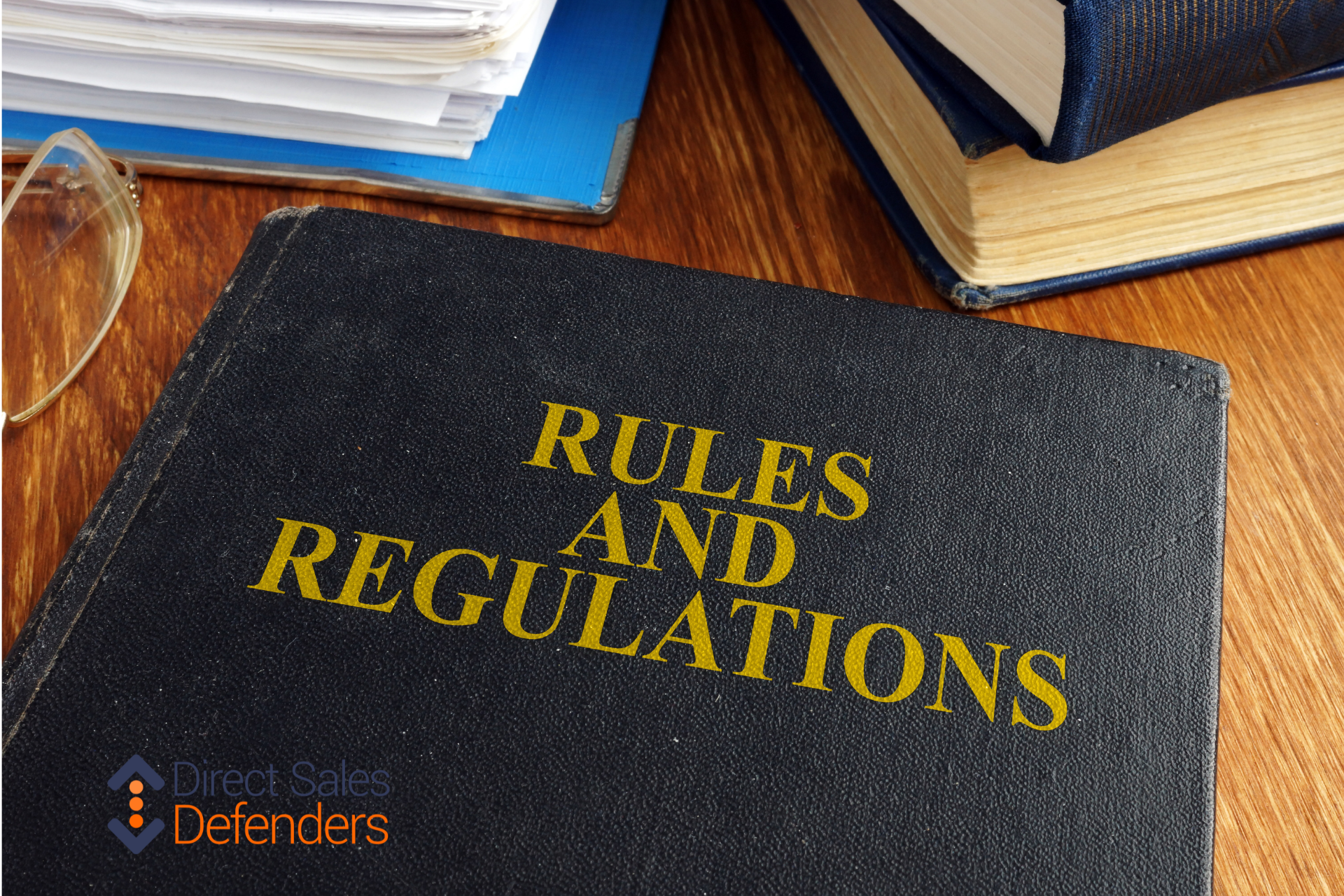Rules And Regulations For Direct Sales Companies In 2023
Direct selling has a long and complicated background. But despite that, it is considered the world’s largest distribution route. Naturally, there are rules and regulations that dictate how direct sales companies can operate, hire, and sell.
In simple words, direct selling refers to a one-on-one transaction in which a consumer acquires an item or service from another person – sometimes known as an individual distributor or representative – who is informed about the goods or services being sold. These representatives sell on the company’s behalf and earn from it. And while this form of selling allows for deeper penetration, it does have the tendency to go haywire.
Hence, consumer safety rules and regulations as well as the implementation of legitimate business practices safeguarding direct sellers are critical in automobile, healthcare, e-commerce, and other specialized industries. Without them, it may be nearly impossible for direct sales companies to establish trust among consumers.
Here are rules and regulations for direct sales companies to bookmark in 2023.
All businesses must follow basic legislation and regulatory requirements in many nations: general customer safety, honesty in marketing, acceptable manufacturing procedures, and so on.
In most places, multi-level marketing (MLM) or anti-pyramid legislation applies to direct selling companies worth USD 190 billion globally. These policies defend the direct selling industry’s credibility by controlling or attempting to remove “bad performers.”
Look closely at three regulating measures to safeguard customers and direct sellers.
Consumers are protected by state regulation
Regardless of what a direct selling company deals in (be it tech, luxury, finance or direct marketing), government entities worldwide regulate all businesses to safeguard consumers and maintain compliance. Administrators throughout the world have been directed by their governments to safeguard consumers.
- China’s State Agency for Business Regulations
- Several additional nations have national-level Fair Trade Commissions
Common, official regulations:
- Set boundaries and clarify what a company can and cannot accomplish using its company and goods
- Maintain an equal playing field among industry participants
- Inform customers that when they buy items or conduct deals with a complying, regulated organization, they can anticipate a specific level of quality
Federal and municipal rules help to develop customer trust by guaranteeing that, for instance, food is safe to consume and automobiles run correctly and are not unsafe to drive.
Ponzi scams are usually dishonest and sometimes masquerade as direct selling enterprises. A pyramid scheme is a program that provides pay for finding people to enter the scheme rather than focusing on income from actual, legitimate product sales.
Anti-pyramid legislation aims to classify and outlaw these deceptive practices. Special rules separate legal direct selling from pyramid schemes, in addition to the basis of pay, but also via corporate regulations to buy unsold merchandise and the restriction on goods loading.
Pyramid schemes are prohibited in practically every country on the planet. Many nations also have rules governing multi-level marketing and personal or independent worker permits.
Direct selling companies must follow these numerous national and municipal rules that provide safeguards and assurances to their wholesalers and clients so that they may feel secure.
Governments frequently search for industries that can self-regulate. In several nations, trade or intergovernmental groups play an important role in setting quality standards to which its members must adhere.
World Trade Association, World Chamber of Trade, and World Organization of Direct Selling Associations are some pertinent global examples.
These bodies are important because they foster company collaborations, give sector-specific counsel and assistance on significant topics, work with lawmakers to improve public policy concerns, and recommend best practices, which are often above the legal safeguards.
The International Federation of Direct Selling Association, for instance, has a Code of Practice that establishes criteria for participants in a variety of pertinent areas, such as:
- Recruiting procedures
- Guarantees on products and services
- Inventory stock sale and return
- Schemes based on pyramids
- Earnings assertions
They also possess the ability to enforce the regulations and impartial code assessors, with penalties ranging from fines to expulsion from the federal Direct Selling Association.
Multi-level marketing (MLM) is a vast and diversified sector that employs various organizations and selling tactics. Though multi-level marketers offer their goods or services in various ways, essential customer protection rules apply to all sector members. The Commission staff provides this non-binding guideline to help multi-level marketing adopt those important tenets to their business operations.
 Direct selling is a broad word that refers to a range of business models based on person-to-person selling in settings beyond a retail institution, including social media sites or the salesperson’s or potential customer’s house.
Direct selling is a broad word that refers to a range of business models based on person-to-person selling in settings beyond a retail institution, including social media sites or the salesperson’s or potential customer’s house.
A multi-level marketer often sells services or goods through a system of salesmen who are not firm workers and therefore do not earn a salary or pay.
Employees of the company’s workforce are often considered freelance contractors who receive money based on their sales and costs.
Usually, the corporation does not actively hire its salespeople but instead relies on current salesmen to recruit new representatives, resulting in many tiers of “resellers” or “contributors” grouped in “downlines.” The “downline” of a member is the system of recruiters, candidates of applicants, and so on.
The most commonly cited explanation of an illegal MLM structure occurs in the FTC’s Koscot judgment, which said that such organizations are “marked by the transfer of money by members to the business in exchange about which they obtain money.”
- The authority to sell goods
- The opportunity to collect benefits unconnected to the product being sold to end users in exchange for hiring new program members
A MLM pay system that incentivizes members to purchase stuff and recruits more members to purchase products to progress in the marketing program, instead of in response to public consumer demand, offers special risks of damage.
Where an illegal remuneration system exists, a member is unlikely to gain revenue or recover expenses by selling merchandise to the general market.
In such cases, participants frequently strive to hire new members who will purchase goods and urge current recruits to purchase the product with little regard for customer demands.
 In the most basic sense, the rules require a MLM to provide income based on genuine sales to real consumers instead of merely wholesale buys or other payments made by its members.
In the most basic sense, the rules require a MLM to provide income based on genuine sales to real consumers instead of merely wholesale buys or other payments made by its members.
In reviewing MLM activities, the FTC looks at how the organization performs in practice, considering variables such as advertising statements, member experiences, the pay plan, and the temptations that the payment scheme produces. The FTC reaches a fact-specific conclusion about a MLM’s pay system after rigorous research.
Product bought and eaten by members to meet their own actual product need, as opposed to all goods bought and used by members but not sold, is not symptomatic of a dysfunctional MLM payout system.
For instance, the final ruling submitted by the FTC allows remuneration based on individual usage and is subject to certain constraints and confirmation procedures.
Nevertheless, the FTC’s law enforcement record has revealed that MLM members may purchase goods – and recruit or push other members to purchase the product – for motives other than what they or other customers desire, such as advancement in the marketing strategy.
Like other issues involving evaluating a MLM’s compensation system, this issue is fact-specific and entails thoroughly examining variables.
However, it is useful to emphasize two subjects that the FTC is likely to address when examining a MLM’s provision of compensation that is based, in part, on members purchasing non-resold items.
First, the FTC staff would likely assess whether aspects of the MLM’s incentive structure reward or encourage members to acquire merchandise for purposes other than meeting their own needs or legitimate customer needs in the marketplace.
Secondly, the FTC team will likely assess whether specific wholesale orders made by company opportunity applicants were done to meet personal needs.
BurnLounge said its members purchased product bundles that included sales sites and music-related products because they intended to use them.
Nevertheless, when BurnLounge’s product bundles were separated from the marketing opportunity, monthly sales of all these bundles dropped by over 99 percent. The real market accounted for just a minimal portion of package orders, and BurnLounge was deemed to possess an unfair or misleading pay structure.
Unfortunately, such a requirement does not exist. Therefore, as previously stated, an MLM’s reward system must be founded on genuine sales to real consumers to conform with the FTC Act.

